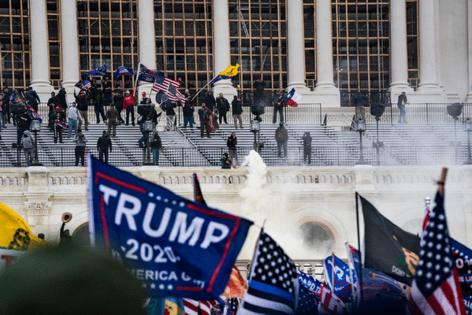Commentary: Foreign interference is now the norm, and it could fuel more violence under Trump
Published in Op Eds
While there have been no credible claims of fraud contributing to Donald Trump’s victory on Tuesday, and the vote does not appear to have even been close, the election was marred by foreign interference, a commonplace occurrence in every U.S. election since 2016.
There was a steady stream of disinformation and multiple attempts by Russia to meddle in the electoral process this year. In the lead-up to the election, the Federal Bureau of Investigation singled out Russia as the “most active” foreign threat, noting that Moscow was conducting influence operations with the goal of undermining confidence among Americans in the integrity of our elections.
On election day, bomb threats were conveyed to polling sites in battleground states Georgia, Michigan, Arizona and Wisconsin, with the FBI stating that the hoax threats emanated from Russian email domains. Two polling sites in Georgia had to be temporarily evacuated, and it remains unclear whether this deterred any voters. In early September, an indictment against two RT (formerly Russia Today, a Kremlin propaganda outlet) employees detailed a scheme to funnel $10 million to finance prominent right-wing commentators in the United States, part of a pro-Trump media platform registered in Tennessee.
The Russians also ran an effective “doppelganger” network of websites that mimicked legitimate American news outlets like the Washington Post but published fake news to undermine confidence in elections and increase polarization.
Russia was not the only foreign actor involved, as both China and Iran sought to conduct “hack and leak” operations during and after the elections.
Trump’s predilection for praising Russian dictator Vladimir Putin makes it unlikely that he will raise this issue during their future conversations or meetings. In the past, Trump has sided with Putin over the U.S. intelligence community and constantly refers to the “Russia hoax” to downplay past Russian interference in U.S. elections.
With such a passive approach from the federal government, Russian interference in the U.S. political system and American culture is an inevitability. Many are concerned about these and other potential sources of domestic instability, including a surge in far-right violence that could be encouraged by foreign actors or by Trump himself.
It’s certainly true that we would have been in a perilous situation if Vice President Kamala Harris had won by a small margin and Trump had called the results “rigged”: A few days ago, that looked like the most direct line to political violence in the election’s aftermath.
And to be sure, there are counterterrorism analysts who are concerned about a violent reaction by the far left to another Trump presidency. Some on the far left view a second Trump term as an existential crisis and likely will be motivated to take to the streets to protest. Trump has threatened to deploy the U.S. military to quell demonstrators, and if he follows through, that could result in a serious escalation of left-wing violence. Other issues — including access to abortion, climate change and the war in Gaza — also could mobilize some on the left to see their causes as justifying violent resistance.
But another byproduct of four more years of Trump could very well be a rash of incidents such as the country experienced during his first term, when racially and ethnically motivated violent extremists, including neo-Nazis and white supremacists, launched attacks at: the “Unite the Right” rally in Charlottesville, Va., where a woman was killed after being run over with a car; a Pittsburgh synagogue, where violence killed 11 people and injured six more; and a Walmart in El Paso, Texas, where a gunman killed 23 people and injured nearly another two dozen.
The attackers in both the Pittsburgh and El Paso incidents were motivated in part by the “Great Replacement” theory, a white supremacist trope claiming that the ongoing “replacement” of the white, Christian population in the United States is the deliberate strategy of a nefarious cabal. In December 2023, Trump said that undocumented immigrants were “poisoning the blood of our country.” As Anne Applebaum has pointed out, Trump has frequently used dehumanizing language such as “vermin,” a style and approach that is reminiscent of Hitler, Stalin and Mussolini.
Speaking in mid-October in Arizona, Trump said, “When I win on Nov. 5, the migrant invasion ends and the restoration of our country begins.” There’s no reason not to take Trump at his word. Just how he intends to end the “invasion” has never been clear. Some Americans, as occurred in Pittsburgh and El Paso, may seek to take matters into their own hands. It is not unrealistic to see a spike in far-right attacks on immigrants, with the perpetrators claiming that they are doing what the president asked, taking back the country from what he called the “enemies within.” He could even pardon them from federal charges, as he has said he would pardon the terrorists who attacked the Capitol on Jan. 6, 2021.
As demonstrated by the terrorist attack by a far-right extremist against African Americans at a Buffalo, New York, supermarket in May 2022 or the shooting of three African Americans at a Dollar General store in Jacksonville, Florida, in August 2023, racially motivated violence is not unique to the Trump administration. However, what violent extremists perceive as a tacit nod of approval — based on Trump’s own violent rhetoric — could lead to a surge in domestic terrorism in a country that remains anxious, angry and well-armed.
____
Colin P. Clarke is the director of research at the Soufan Group, an intelligence and security consulting firm in New York City.
©2024 Los Angeles Times. Visit at latimes.com. Distributed by Tribune Content Agency, LLC.




























































Comments